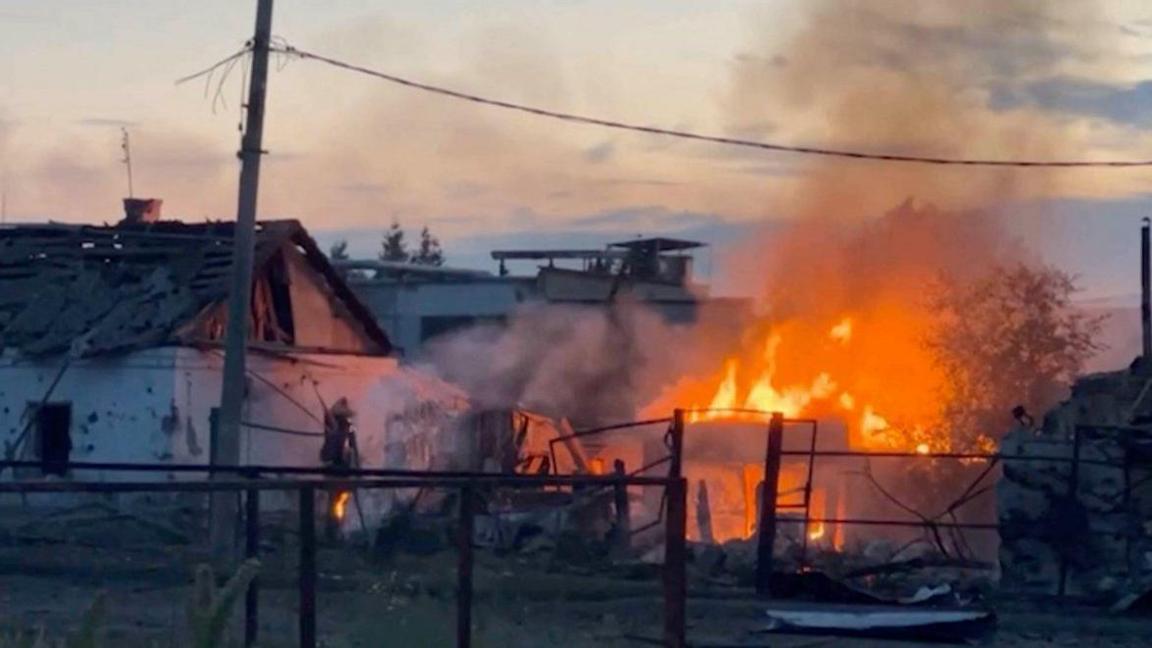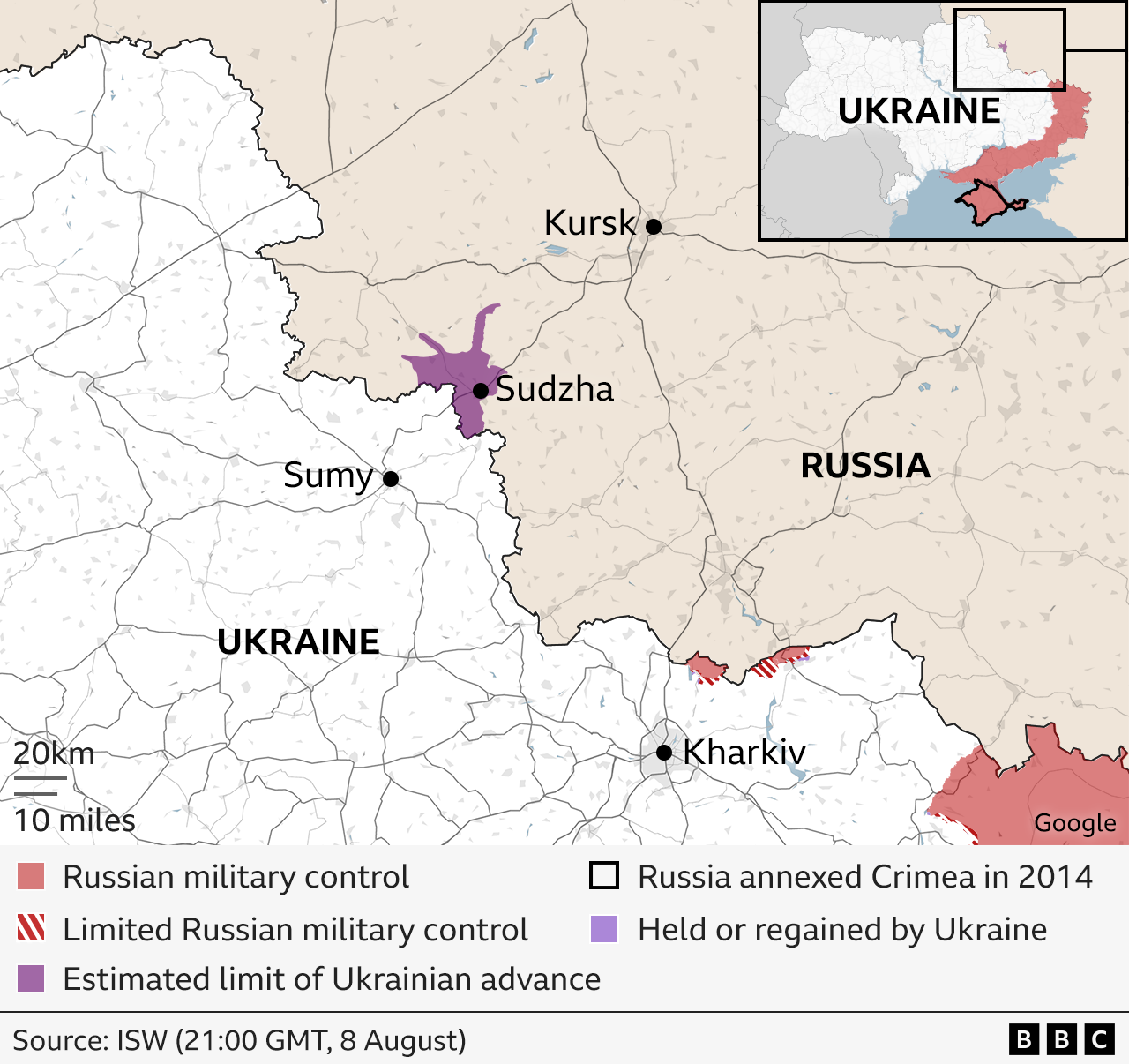Ukraine's cross-border attack into Russia enters fifth day

A burning house in the town of Sudzha, Kursk region
- Published
Ukrainian troops are continuing their offensive in Russia’s western Kursk region, as their surprise cross-border attack enters a fifth day.
The Russian defence ministry said on Friday it was “continuing to repel” Ukraine’s military, which it claimed had lost more than 280 personnel in the past 24 hours - a figure that has not been independently verified.
Reports suggest that Ukrainian troops are operating more than 10km (six miles) inside Russia - the deepest advance by Kyiv since Moscow launched its full-scale invasion of Ukraine in February 2022.
Ukraine has not openly admitted the incursion, but President Volodymyr Zelensky said this week that Moscow must "feel" the consequences for its invasion.
Fighting in Kursk has edged gradually closer to a nuclear power plant, prompting the UN nuclear agency to release a statement urging the two sides to “exercise maximum restraint”.
International Atomic Energy Agency (IAEA) chief Rafael Grossi appealed to all sides to take measures “to avoid a nuclear accident with the potential for serious radiological consequences”.
Some residents of the Kursk region were evacuated by authorities, with a group pulling into Moscow’s central train station on Friday. One unnamed resident told AFP news agency: "It's terrible. They are bombing.”
Russia's defence ministry said more troops with heavy armoury were being deployed in the Kursk region.
A counter-terrorist operation has been declared there, as well as in the neighbouring Belgorod and Bryansk regions - a move that underlines how grave the current situation is.
The local authorities now have powers to restrict the movement of people and vehicles, allow the use of phone taps and impose temporary evacuations.
Separately, Ukraine's military said it had struck a military airfield deep inside Russia on Friday, destroying a warehouse containing hundreds of glide bombs.
The targeting of the Lipetsk air base, more than 350km (217 miles) from Ukraine's border, is the kind of operation Kyiv has been wanting to do for some time.
The weaponry it managed to destroy in the attack is the very kind Russia has used to terrorise Ukrainian towns, cities and military positions for most of its invasion.
The military's statement also said the airfield was known for housing Russia's Su-34, Su-35 and MiG-31 war planes.
Local Russian authorities said a state of emergency was in place in the area, confirming what they described as “detonations” at an "energy infrastructure facility". Residents of four nearby villages were evacuated.
Hours after Ukraine’s strikes, Russia responded by striking a shopping centre in the Ukrainian town of Kostyantynivka, close to the frontline in the eastern Donetsk region, killing at least 14 people and injuring 43, Ukrainian officials said.
Residential buildings, shops and more than a dozen cars were also damaged in the attack.

Three days after Ukraine’s offensive was launched on Tuesday, the Russian defence ministry said its forces were managing to suppress "raid attempts by enemy units".
But a video checked by BBC Verify shows a different picture, with a 15-vehicle Russian convoy damaged, burned and abandoned on a road through the town of Oktyabrskoe, roughly 38km (24 miles) from the border on the Russian side.
The early morning footage also shows Russian soldiers, some injured, possibly dead among the vehicles.
Russia said that up to 1,000 Ukrainian troops, supported by tanks and armoured vehicles, entered the Kursk region as the offensive began.
Despite the deployment of reserve troops and orders to evacuate, Russia has been unable to slow the momentum of this Ukrainian advance.
Footage posted online shows destroyed Russian convoy
This is more than the probing attacks we have seen in the past.
It is a committed assault which has shocked Russia’s military and the Kremlin. For the last 18 months, it has been Moscow dictating the dynamics of this war.
Now it is having to contain this attack, as well as domestic criticism for not preventing it in the first place.
Despite long-time Western worries of an escalation, the consensus among Ukraine’s allies is that this operation falls within its right to defend itself.
While he is yet to directly reference the assault, President Zelensky said in a video address late on Thursday: “Russia has brought the war to our land and should feel what it has done.”
But with his Ukrainian forces still outnumbered by the Russians on the battlefield, the line between masterstroke and miscalculation is a fine one.
The Russian rouble was down 2.5% against the dollar on Friday, with traders telling AFP news agency that Ukraine’s Kursk offensive was one of the reasons behind the fall.